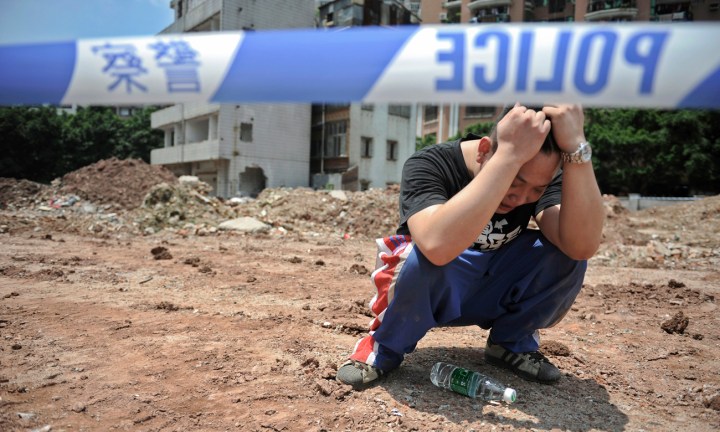Newsdeck
China’s suicide bomber: Hero or heroine?

For 24 hours, China had its first female suicide bomber, with the story of her protest against illegal land grabs going viral as bloggers dismissed the carnage and hailed a modern-day "heroine" for the rights of common people. A day later, state media said the perpetrator was male and hell-bent against society. That facts can change so dramatically overnight underlines two disturbing truths about China. By KENT EWING.
For 24 hours last week, it appeared China had witnessed its first female suicide bomb attack, but the perpetrator wasn’t a Uyghur protester or a Tibetan separatist. Rather, she appeared to have been one of the millions of angry victims of government land grabs – this one taking place in a remote township in southwestern Yunnan province.
Almost immediately, the story went viral, attracting a legion of followers and underscoring both the breadth and depth of the outrage and frustration generated across the nation by illegal government land seizures.
With alarming ease, microbloggers dismissed the carnage the bomb had wrought – four people died in the blast, including the bomber, and 16 were injured, four seriously – and hailed the bomber as a modern-day “heroine” and “pioneer” for the land rights of common people. “When laws can no longer extend justice,” wrote one, “this behaviour is most righteous.”
Until last Thursday’s explosion, female suicide bombers were unheard of in China, and commentators were quick to note the potential significance of the gender of the attacker, with some analysts suggesting that this gruesome act of desperation and defiance could become a landmark event in the battle against land seizures by corrupt officials.
Amid the shock and horror there was hope the long-standing problem of the rampant expropriation would finally be addressed.
A day later, however, the official version of the story carried by state media had changed completely. Now the suicide bomber was not a woman – or, according to some previous reports, a woman carrying a baby – but a 26-year-old man named Zhao Dengyong who had only recently moved to Baihetan, where the attack took place, and was not involved in a land dispute.
Local police speculated that Zhao’s motive for the attack may have been “revenge on society”, and the Chinese Communist Party secretary for Qiaojia county described Zhao as a dangerous sociopath with a criminal record, although no evidence of this has been presented to the public.
How had the story changed so dramatically overnight?
At the same time Xinhua News Agency was naming Zhao, a day labourer and motorcycle taxi driver, as the culprit, a local newspaper, the Chuncheng Evening News, ran a full-page report on the bombing that included a detailed description of the female bomber. She was identified as a woman from Pingzi village in Baihetan who was carrying a 15-month-old child when the blast occurred. The Chuncheng Evening News article said the woman concealed the bomb in the baby’s clothes.
According to both reports, the bomb exploded in the demolition bureau of Baihetan’s community office as residents lined up for compensation for farmland seized for the construction of a hydroelectric power station.
On Thursday, Xinhua quoted a newspaper in Kunming, provincial capital of Yunnan, saying a woman detonated the bomb after being told to sign a relocation agreement that would have allowed the demolition of her property.
On Friday evening, however, the agency reported that Qiaojia public security officials had shown closed-circuit television footage identifying Zhao as the bomber. According to the Xinhua report, the footage showed a man dressed in multiple layers of clothing and carrying a backpack enter the demolition bureau and explode the bomb at 9:04 am.
Local authorities say that man was Zhao and claim to have found traces of Zhao’s DNA at the scene. So far, however, no witnesses spoken to by independent news outlets can remember seeing Zhao at the bureau that morning.
Qiaojia security chief Yang Chaobang was adamant that Zhao was the bomber. “I can guarantee in the name of my office and my own prospects that Zhao is the suspect in the case,” Yang reportedly told a press conference on Monday. “As to whether there were other people involved, police are still investigating.”
Since demolitions began eight years ago in Qiaojia, residents have complained that the pay-outs offered by the local government are far less than the sale price later collected for their land. But their complaints, like so many in villages all over China, have fallen on deaf ears.
Two weeks ago, a resident of Laodian, another Qiaojia village, wound up dead after protesting against the expropriation of his land, with other villagers claiming he was beaten to death at the township office. Just last Wednesday, a woman in southern Guangdong province’s capital, Guangzhou, jumped to her death as a protest against the forced demolition of her home.
Nearly a year ago, the city of Fuzhou, in eastern Jiangxi province, was rocked by three explosions outside government office buildings that left two people dead and six injured. Before turning violent, the bomber, Qian Mingqi, who died in the blast, had waged a 10-year campaign over the forced demolition of his home to make way for an expressway.
Last December, in a story that made international headlines and raised hope about political reform in China, the people of the Guangdong village of Wukan managed to oust their corrupt village committee, which for years had been ripping off their land and employing thugs to beat up anyone who protested against it.
In February, Wukan held its first free election, replacing those corrupt officials and, optimists hoped, marking a step toward a more democratic China and the beginning of the end of illegal land seizures.
The Chinese Academy of Social Sciences, an official think-tank, estimates that 6.7-million hectares of land have been arrogated over the past 20 years. Moreover, according to the academy, total compensation paid out for that land fell $158.4-billion below the market price.
Since China’s economic boom started in 1978, says the academy, at least 50-million farmers have lost their land and that land disputes account for 65% of the country’s “mass incidents” – the government euphemism for the kinds of protests in which angry people at their wit’s end see no other form of recourse but to blow up themselves and others.
It really doesn’t matter whether the Yunnan bomber last week was a man or a woman – or even whether he or she was involved in a land dispute. No matter what the facts are in the Yunnan incident, it underlines two disturbing truths about China. Firstly, despite the promise of Wukan, corruption and land seizures are alive and well in the country.
Secondly, no one believes reports by state media.
This edited article is used courtesy of Asia Times Online, who retain copyright.
Photo: Xian Xiyong, son of Li Jie’e, cries next to a police line after his mother jumped off a building and died at a demolition site of Yangji village in Guangzhou, Guangdong province May 10, 2012. Li Jie’e, a resident of Yangji village, jumped off a building and died on Thursday after her house was demolished on March 21, local media reported. REUTERS/Stringer.




















 Become an Insider
Become an Insider